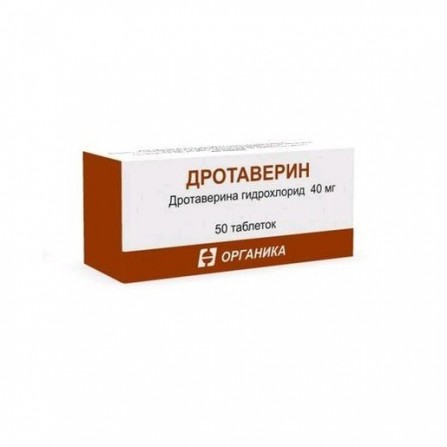Drotaverine pills 40mg N50
Condition: New product
1000 Items
Rating:
Be the first to write a review!

More info
Description
Drotaverine pills - myotropic antispasmodic. On the chemical structure and pharmacological properties similar to papaverine, but surpasses it in effectiveness and duration of action. Reduces the tone of smooth muscles of internal organs, reduces their physical activity. Has a vasodilating effect.
Release form
Pills
Composition
Drotaverine hydrochloride 40 mg, lactose monohydrate 62.9 mg, povidone (collidon 25) 4.2 mg, crospovidone (collidon CL) 1.4 mg, magnesium stearate 1.4 mg, potato starch 28 mg, talc 2.1 mg.
Indications
Spasm of smooth muscles of internal organs: renal colic, biliary colic, dyskinesia of the biliary tract and gallbladder in hyperkinetic type, intestinal colic, pyelitis, cholecystitis, spastic constipation, spastic colitis, proctitis, tenesmus, pilorospasm, peptic ulcer, duodenal ulcer aggravations, as part of complex therapy), pain in spasms of peripheral arterial vessels (endarteritis), vessels of the brain, coronary arteries, algomenorrhea, threatening miscarriage, threatening premature Belt labor, uterine shed spasm during labor, prolonged opening of the pharynx, postpartum contractions. For some instrumental studies, cholecystography.
Use during pregnancy and lactation
Drotaverine does not possess teratogenic and embryotoxic action. However, the use of the drug is recommended only after a careful weighing of the ratio of the estimated benefits and possible risks. Due to the lack of necessary clinical data, it is not recommended to administer Drotaverine during lactation (breastfeeding).
Dosage and administration
Inside. Adults - 40-80 mg 3 times a day. Children aged 3 to 6 years old - 40-120 mg in 2-3 doses, the maximum daily dose is 120 mg, from 6 to 18 years old - 80-200 mg in 2-5 doses, the maximum daily dose is 240 mg.
Side effects
Possible - dizziness, palpitations, hypotension, nausea, constipation, allergic reactions.
Overdose
Symptoms: violation of the atrial-gastric conductivity, decreased excitability of the heart muscle, cardiac arrest and paralysis of the respiratory center. Treatment: symptomatic therapy.
Interaction with other drugs
It weakens the anti-Parkinsonian effect of levodopa (increased rigidity and tremor). It enhances the smemasolytic effect of papaverine, bendazole and other antispasmodics, including m-anticholinergics. Reduces the smemogenic activity of morfine.
special instructions
Contraindications: hypersensitivity, cardiogenic shock, arterial hypotension, angle-closure glaucoma, prostate adenoma, severe hepatic and renal failure, lactation period, children under 3 years of age. With caution: pronounced atherosclerosis of the coronary arteries.


